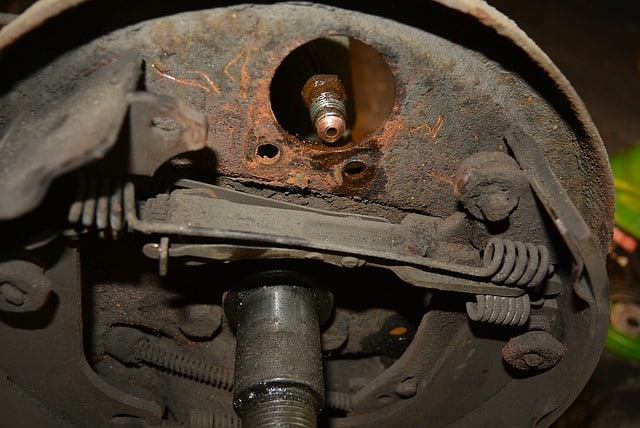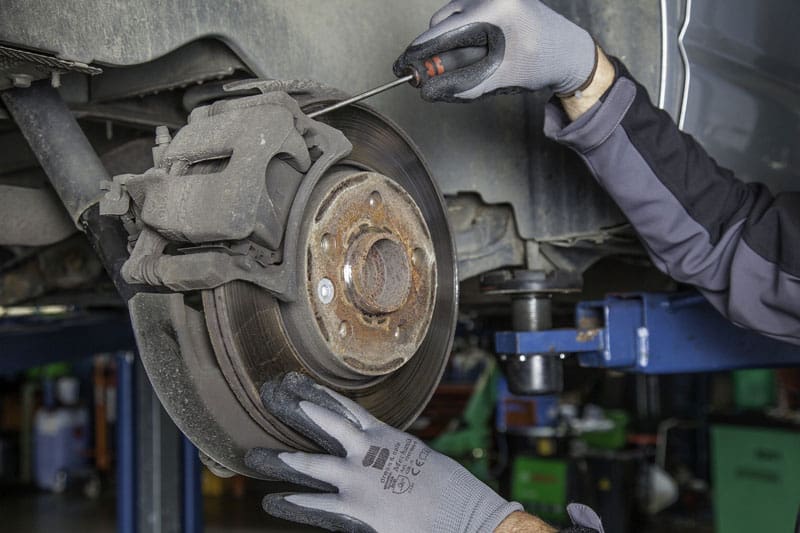Since the invention of cars manufacturers and motorsports teams have continuously advanced brake systems to optimize performance. Drum brakes were used on cars leading up until the 80’s and 90’s when the use of disc brakes started to be more common. Now, most cars, trucks, and SUVs are made with disc brakes because of their superior braking performance.
But why are disc brakes favored over drum brakes? Why do disc brakes offer better braking performance?
Table of Contents
How Brakes Work – Friction and Heat
Modern brake systems on cars work by creating friction between brake components to slow the vehicle down to eventually bring it to a stop.
Drum brakes use a rotating drum that is attached to each wheel and brake shoes the are inside of the brake drum in order to create friction to slow your car down. When you press the brake pedal the brake shoes are applied to the inside of the brake drum which creates friction and slows the car down.
Disc brakes use a brake rotor that is attached to each wheel and a brake caliper that clamps down on the brake rotor to slow your wheels down to a stop. As you press the brake pedal inside your car the brake caliper (along with brake pads) apply pressure to the brake rotor which creates friction and causes the wheel to slow down.
Friction over time will create heat which needs to be dissipated to allow your brakes to work properly. Heat buildup will create brake fade which reduces the braking power of your brake system.
One of the main reasons drum brakes were phased out if because they don’t dissipate heat as well as disc brakes.
Drum brakes, because of their drum design, don’t have a way to get air into the inside of the drum to cool down the drum brake assembly. Disc brake rotors have fins inside of them that rotate along with your wheels and are able to pull in cool air to cool the rotor down.
The design of disc brakes is vastly superior at dissipating heat and cooling down the brake system, reducing brake fade.
Advantages of Drum Brakes
One of the main advantages of drum brakes is that they provide a larger contact patch between the brake shoes and the drums which allows drum brakes to provide more braking force than equivalent disc brakes.
Because the contact patch between the brakes shoes and drum is larger this allows the braking force to be spread over a larger area which allows drum brakes to last longer than similarly equipped disc brakes.

Another advantage of drum brakes is that they are cheaper to make than disc brakes, which is one of the main reasons they are used on low-cost vehicles. Drum brakes will save money on the final price of a car if they are used instead of disc brakes.
Disadvantages of Drum Brakes
While drum brakes used to be common on vehicles they have since been phased out in favor of disc brakes. The two main issues with drum brakes are heat buildup and the complexity of working on drum brakes.
One of the main downfalls of drum brakes is their drum design. Because of the design of drum brakes, cool air will mainly pass on the outside of the drum but won’t easily be able to get inside of the brake drum to cool the internals of the brake drum down.
As brake drums begin to heat up this can cause the drum to warp which can cause vibrations under braking. Excessive heat can also cause the shoes within drum brakes to glaze over which prevents them from being able to properly grip the drum to create the friction necessary to slow it down.
Drum brakes are complex and have many more moving parts when compared to disc brakes. To replace the shoes and brake pad material on drum brakes you have to remove the drum and replace each shoe inside of the drum. These drum brake shoes are held in place by springs which have to be individually configured to allow them to work properly.
How To Replace Drum Brakes
Replacing the shoes on drum brakes can take a lot longer when compared to replacing brake pads on disc brakes because of the complexity of the internals of drum brakes. If you’d like to watch a video that details how to replace the brake shoes on a drum brake check out the video below.
Advantages of Disc Brakes
One of the main advantages of disc brakes is that they are designed to be better at dissipating heat than drum brakes. Looking at disc brake rotors they have two smooth sides that the brake caliper and brake pads will clamp down on. These two smooth sides are separated by fins that run down the middle of the brake rotor.
As your wheels spin the brake rotors will spin at the same rotational speed as your wheels and will suck in air into the fins of the brake rotor which then cools down the brake rotor.
Because disc brakes have fins that allow cool air to go inside of the brake rotor they allow the brake rotor to cool down much faster than a brake drum can.
Disc brakes are also easier to work on and replace than drum brakes. Typically with disc brakes the pads only need to be replaced every 30,000-50,000 miles and replacing brake pads isn’t that difficult to do yourself.
Even if you needed to replace your disc brake rotors and pads it’s not all that hard to do yourself, you just need the right tools for the job and the knowhow.

With the advancement of technology, disc brakes have also started incorporating new materials to allow them to bring your car to a stop faster and to resist brake fade in race and track situations.
Advancements like multiple brake caliper pistons allow the brake calipers more braking force and stopping power which is important as vehicles become heavier and heavier.
On the bleeding edge of brake technology is carbon-ceramic disc brakes. Disc brake rotors made from carbon-ceramic are much harder and can resist brake fade better than normal steel disc brake rotors.
Carbon ceramic brakes still cost significantly more than steel brake disc rotors and will be out of reach for most people but as prices go down they may find their way to more consumer cars. Currently, carbon-ceramic brake rotors are reserved for formula one cars and high-end sports cars like Porsche and Ferrari.
Disadvantages of Disc Brakes
Disc brakes like drum brakes are not immune to heat buildup and can still be negatively affected by heat like drum brakes. If brake rotors get too hot they may warp which can cause vibrations when pressing the brake pedal in your car. Once brake rotors become warped the only solution is to replace them with new brake rotors and pads.
One of the main disadvantages when comparing disc brakes to drum brakes is the cost associated with having disc brakes equipped on your vehicle. Disc brake rotors take more time to manufacture than drum brakes and will typically cost more.
But keep in mind the cost for disc brake rotors can vary widely based on where you buy them from. Disc brakes from the vehicle manufacturer will cost more than disc brakes purchased at AutoZone or eBay so really the cost will be determined by where you purchase your replacement disc brakes from.
How To Replace Disc Brakes
If you’d like to replace your disc brakes yourself I’d recommend going onto Youtube and watching a video on the procedure for your specific car.
Every car is different so the process will be a bit different from car to car. If you’d just like to see the detailed process on a car that most likely isn’t yours check out the video below.
Disc Brakes Vs Drum Brakes – Stopping Power
In regards to stopping power drum brakes actually have a larger surface area that allows them to bring a vehicle to a stop better than disc brakes. But the main issue with drum brakes is that they aren’t able to sustain multiple heaving braking periods back to back without heating up significantly.
Once drum brakes become super-hot their braking power is reduced until they have the chance to cool back off again. While drum brakes are hot they will have a higher chance of warping which is one of the main downfalls of drum brakes.
Disc brakes are much better at cooling themselves down which is one of the main reasons they are favored over drum brakes. To provide disc brakes more stopping power vehicle manufacturers have started developing disc brake calipers with multiple pistons.
The more pistons a brake caliper has the larger braking surface it will have to clamp onto the brake rotor which results in more braking force and stopping power.
Usually, brake calipers with multiple pistons are reserved for sports cars or heavy vehicles that require additional stopping power to bring the vehicle to a stop.
If you are looking for the ultimate stopping power do your research and find a car that comes with brake calipers that have multiple pistons from the factory. Otherwise, you will have to install the upgraded calipers (which usually will require different brake rotors and pads) on your own.
Related Questions
Why Are Drum Brakes Still Used? Drum brakes are slowing being phased out but there are still some instances where they are still used. Drum brakes are mainly used because of the low costs to manufacture drum brakes and because they are able to generate more braking force than comparable disc brakes.
Is There ABS on Drum Brakes? Both drum and disc brakes can have ABS (Automatic Braking Systems) systems equipped to them to allow the ABS system to operate if skid or slide is detected.
ABS systems allow the brakes to pulsate many times per second if the system detects that a wheel has lost traction under heavy braking or if your vehicle is sliding out of control.
Do drum brakes need to be replaced? How many miles will drum brakes last? Yes, drum brakes will eventually need to be replaced as the shoes inside of the drum brakes will wear down over time. The good thing with drum brakes is that they should last longer than disc brake pads before needing to be replaced.
Drum brake shoes can last anywhere from 50,000-150,000 miles depending on how you drive and how much the brakes are used. While disc brakes will sometimes need to be replaced before 50,000 miles.
What is the biggest disadvantage of the drum brake system? The biggest disadvantage of the drum brake system is the heat buildup that can occur under heavy braking. Because drum brakes don’t have a way to get air to flow inside of the drum easily they don’t have a way to cool down the drum quickly after instances where heavy braking is needed.
If the heat levels get too high drum brakes can warp and cause vibrations when the brakes of the vehicle are applied. Once the drum brakes have become warped the drum assembly would need to be replaced with a new one to eliminate the vibration effect.
Disc Brakes Vs Drum Brakes – In Conclusion
Hopefully, by now, you understand the differences between disc brakes vs drum brakes and can make an informed decision about which type of braking system is right for you.
Disc brakes are the newer technology and will be better developed to resist heat and brake fade. Drum brakes are cheaper but are complicated to work on and are worse at dissipating heat.

